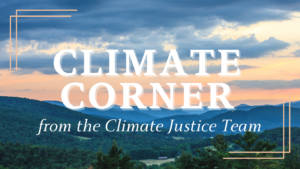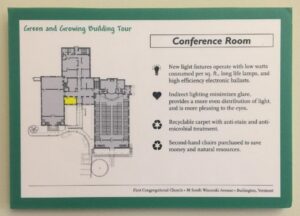
March 7, 2025
At this week’s Climate Justice Team meeting we concluded that it would be good to send you all information regarding a current petition about key funding for transportation for Vermonters. The Vermont Sierra Club, along with other organizations such as AARP, are supporting this effort to continue and augment funding for organizations that provide transportation for this living with disabilities, and those who do not own, or cannot drive a car, to get to jobs, school, medical care and food, etc. Recent cuts in funding of bus and other ride-sharing options have made the problem of getting to work and “living in general,” much more difficult for many of us and our neighbors.
The Climate Justice Team ask that Congregation members CLICK HERE to learn more and to consider signing the petition that will be presented to Governor Scott and state legislators. This is not a solicitation for funds, just a request for the support of your signature. Thank you for consideration,
– FCCB Climate Justice Team
~~~~~~~~~~~~~~~~~~~~~~~~~~~~~~~~~~~

SUSTAINABLE HOLIDAY IDEAS from the FCCB Climate Justice Team
The holidays are upon us! We can reduce consumption by using renewable resources and repurposing objects. Celebrations can be a time of sustainable traditions and helping the environment.
- CLICK HERE for some fun ideas for “greening” your holiday decorations, gifts, food and more.
- Have a safe and sustainable holiday and share eco-friendly practices with family and friends. As Christ led by example and inspired us, let us do the same by making “green” choices.
In faith,
The Climate Justice Team at FirstChurchBTV
November 8, 2024:
The list below is one way of looking at climate change. If you do not agree, please let me know so we can talk about it. I would love to understand your viewpoint.
- Climate change is real. The earth will get warmer and more difficult for us humans who are used to the milder climate of the last ten thousand years.
- Adaptation (such as better air conditioning) is, at best, a temporary solution if the average global temperature keeps increasing. Moreover, it is out of reach for those who do not have the resources (money) for this adaptation technology.
- Preventing further climate change requires that we first get real on the cause of this climate change: our use of climate changing sources of energy that our civilization consumes. It also requires that we get everyone on earth to agree on that cause and on the need for prevention. Climate change is a global problem that, ultimately, cannot be solved locally.
- However, getting to such an agreement on causes and needs can and should start locally. The best way to show others that action is needed is by showing through our individual actions that the problem is serious, even when, eventually, it should be addressed globally.
– If you are concerned about climate change, our Climate Justice Team wants to hear from you, please be in touch!
Leendert Huisman, Climate Justice Team member
November 3, 2024:
“GET” a Great Local Publication: Nearly 100% of climate scientists agree that the over-use of fossil fuels by those of us living in prosperous nations accounts for the dramatic increase in ocean temperatures, which in turn increase the power and number of mega tornados and hurricanes we’re seeing.
Many Vermonters have learned about climate change the hard way from flooding the last two summers, including, for the first time ever reports of thousand-year events.
There are numerous sources of accurate information about electrical generation and climate change, both online and in print or digital media. One source you can find at City Market, for free, is called Green Energy Times. It is online and comes out quarterly, covering a wide variety of climate and energy related topics.
For example, the August to October issue has articles on:
- home winterization,
- charging an E car,
- Solar powered boats,
- the latest on solar panels,
- news outlets airing false reports on wind power,
- heat pumps including geothermal units,
- planet friendly outdoor grilling,
- robot electric mowers,
- and more . . ..
It’s well worth picking up a copy of GET to deepen your understanding of what our world is facing and to learn more about what you can do to help soften the impact of climate change.
September 29, 2024
The next U.S. election takes place on Tuesday, November 5. It is important to vote with important issues in mind, in particular the environment in which we live and the climate that affects us all. The national UCC has started a Climate Hope pledge campaign in which it urges members of UCC churches, and others, “to vote as an act of hope for present and future generations”. We, the Climate Justice Team will hand out Climate Hope pledge cards at First Church on October 6 and 20, and we urge all members and friends of First Church to make the pledge, fill out the cards and return them so your pledge can be recorded. You will receive a confirmation of your Climate Hope pledge as well as a reminder a week before the elections to cast your vote in the election.
The Climate Hope symbol is shown below. On the flipside of the card we find the central promise of the pledge: By taking the Climate Hope Voter pledge, you are making a sacred commitment to a more just and equitable world for people of all ages, races and walks of life.

September 20, 2024
First Church UCC of Burlington has been active for many years in reducing its energy usage and, thereby, also its CO2 production. Details are given on little plaques with green borders in many of the rooms. One example is shown below. Try to find all of them!

AUGUST 30, 2024 – Considering Solar
One action that is more substantial and requires more of an initial sacrifice is installing solar panels, on the roof or in the yard. This is of course not for everyone; for example, it does not apply if you are renting. But if it does apply, the benefits can be great. Solar energy is free and the electrical energy that flows into your appliances is green. The energy that your electric company sends you may be green but is more likely generated using oil, gas or biomass, known polluters and green-house gas emitters. The advantages become even better if you also install a battery, because then you can store electrical energy that you do not immediately use in the day-time and use it when the sun is not shining.
One should of course take into account how much pollution is caused by the manufacturing, transporting, installing and eventual discarding of the panels (and the battery). The real benefits towards reducing climate change are rather hotly debated but it seems that, over the lifetime of solar panels, they lead to five to ten times less carbon dioxide production than gas (or coal) fired power plants.
Of course, to collect all that free energy, you first have to buy the panels and have them installed. That is where the initial sacrifice comes in. Fortunately, having your own solar energy farm has financial advantages as well that, over time, will offset the initial cost. First, every kWh (kilo Watt hour, the standard unit of electrical energy) that you collect with your solar panels is a kWh for which you do not have to pay your regular electricity supplier. This advantage is enhanced when you also install a battery. Secondly, you typically can make a deal with the electric company in which it takes the extra energy that you do not use and cannot store, and allows you to retrieve that energy later, in the winter for example when solar panels are far less effective than in the summer. Finally, if you also have a battery, outages (shorter than a couple of days as in the ice-storm of early 1998) will be a thing of the past. If the net goes down for a few hours, you won’t even notice.
AUGUST 16, 2024 – Climate Change & Christianity
Last year, Rev. Elissa Johnk preached her second sermon on Climate Change and Christianity. An important part of that sermon was a recent report on the state of the earth and of life on it. Here is a summary of that report:
Life on earth flourishes in the air, water, land and soil, and for the last 10,000 years that life has been sustained by a roughly constant climate. As human civilizations sprung up, they learned from each other, and we have benefited from their inventions and discoveries. Some civilizations succumbed to local droughts and floods, but, in general, the global climate was stable. This has now changed.
As scientists tried to establish what features of water, air and land determine the global climate, they arrived at two important conclusions. First, they identified nine features that are important for the global and regional climate that have changed significantly over the past 100 years. Second, these features remained constant in the preceding time. They are measurable quantities such as the carbon dioxide concentration in the air and the acidity of the ocean. All of them show some fluctuation over the last ten millennia and that natural variability determines the range of values that are considered safe and do not appreciably alter the climate. Deviations that exceed these natural boundaries indicate a new climate system with partially known and potentially dangerous consequences for humankind.
Six of those nine quantities have now grossly exceeded their natural boundaries and soon will be followed by a seventh. We have created a new global climate that is changing for the foreseeable future to one we have never experienced. It is warmer, more polluted, and species are becoming extinct more frequently. All life on earth is interconnected and sacred, and there are consequences to our behavior. As people of God, how will we choose to respond to this new reality?
Please watch Elissa’s sermon using this LINK
~~~~~~~~~~~~~~~~~~~~~~~~~
AUGUST 9, 2024 – Becoming a Climate Justice Church
As our church moves forward toward becoming a recognized Climate Justice Church in the United Church of Christ, we have discovered many resources and partners.
Here is a partial list of those with whom we are sharing this vital work:
Our denomination – the United Church of Christ – has a national work area called: Creation Justice Ministries. CLICK HERE for a tremendous array of UCC resources and specific projects. Currently they are supporting a campaign: Vote for Climate Hope. We are all encouraged to explore the climate record of each candidate as we vote. Current concerns include the Pacific Ocean Basin and protection of indigenous lands. They are offering a workshop on forming a Spirituality in Nature group for local churches.
Brooks Berndt is our national staff person who oversees the Climate Justice program. He sends a regular email letter focusing on climate concerns called The Pollinator. You can sign up by sending him an email at berndbt@ucc.org
- 350.org – offers a variety of resources for experienced and novice climate justice advocates.
- Vermont Interfaith Power and Light offers educational resources and workshops. Their staff is available to work with Vermont congregations in their climate change efforts.
- Vermont Interfaith Action has a new organizing committee that has a statewide focus on climate work here in Vermont. The VIA website has further information.
- Vermont Public Interest Research Group is another statewide partner with a strong focus on legislation and local efforts to support climate justice work.
- Closer to home, Run On Climate is hosting an event at the Friends Meeting House on North Prospect Street in Burlington. This gathering will focus on the city’s efforts. The gathering is at 6 pm on Wednesday, August 14. More info is available from JuliaHondal513@gmail.com
~~~~~~~~~~~~~~~~~~
JULY 5, 2024
AFFECTING CHANGE: Church members can affect change by staying up to date on environmental and climate policies in the Vermont legislature and by contacting their representatives.
The 2024 session came on the heels of a year that underscored the reality of climate disruption, with devastating flooding impacting communities, ecosystems and infrastructure throughout Vermont. In response, lawmakers passed the Flood Safety Act (S.213). This bill improves public safety and reduces economic impacts by safeguarding high-hazard river corridors, protecting vital wetland ecosystems which naturally mitigate flood risks, and improving dam safety by strengthening maintenance requirements and removing dams that pose a risk to public safety.
A first in the nation, “climate superfund” was established to hold the largest fossil fuel companies accountable for their fair share of costs inflicted on Vermont as a result of climate pollution from their products (S.259).
The passage of H.289 put Vermont on track to achieve 100% renewable electricity across all the state’s utilities by 2035.
Bill H.687 shifts the Act 250 process so it will be applied based on a proposed development’s location, which will make it easier to build housing in well-planned areas while protecting critical natural resources.
Finally, two bills to reduce the use of toxic chemicals advanced this year. Bill (H.706) to bans harmful neonicotinoid pesticides that contribute to pollinator loss and pose potential risks to public health. Lawmakers unanimously passed S.25 to restrict PFAs “forever chemicals” from cookware, juvenile products, artificial turf, textiles, and personal care and menstrual products.
Governor Scott vetoed 3 bills- Act 250 and housing, the Renewable Energy Standard, and the ban on neonicotinoids. All 3 were successfully overrode.
You can follow all Vermont legislative activity HERE – and – if you want to know how our Vermont representatives are voting on environmental issues in D.C. – use this LINK. It is imperative that we all stay informed and encourage our representatives to support bills that advance climate justice…and to thank them when they do!!
Nancy McClellan,
On Behalf of the FCCB Climate Justice Team
~~~~~~~~~~~~~~~~~~~~~~~~~~~~~
June 28, 2024
We may look at this as yet another consequence of climate change, but maybe it is better to see it as a consequence of our inability to agree on the reality of climate change. In either case, we in the First Church Climate Justice Team would like to start a discussion within our congregation about the anxiety itself. How serious is it, how wide-spread? And, most importantly, what can we as a congregation do about it? Better information about what climate change is, what causes it, what the possible consequences are, and what can be done to alleviate the severity of those consequences will help, but will it be enough? Information about what we as individuals can do to at least reduce the severity of climate change may also help, and we have started providing such information on the Climate Cornerpage on our church website.
But one new thing that we really would like to do is have discussions with people about climate change anxiety itself: what are you anxious about, how does it affect you or your family or friends? We feel that just talking about these anxieties may help; it will also help us, on the Climate Justice Team, to better focus our efforts in helping the congregation. If you would like to participate in such discussions, please talk to me before or after the Sunday worship service – or send me an email, or talk to any member of the Climate Justice Team, or write us via email to the First Church’s Office Manager at office@firstchurchburlington.org
Peace,
Leendert Huisman, lmhuisman35@gmail.com
~~~~~~~~~~~~~~~~~~~~~~~~~~~~~~~~~~~~~~
JUNE 21, 2024: How to reduce your carbon footprint and save money! That may sound farfetched but it’s true. How you drive your car is as important as what you drive. Fossil fuel powered motor vehicles still dominate and they’ll be around for decades. Here’s some background on how and why you can drive to reduce your fuel consumption and your CO2 output.
- The fuel efficiency of gas-powered motor vehicle engines tops out at about 55 miles per hour. Increase your MPH and you’ll reduce your MPG while increasing your gas bill.
- Each gallon of gas burned creates 20 pounds of CO2. (1 atom of carbon from the fuel joins with 2 atoms of oxygen in the atmosphere = CO2). Due to aerodynamics and other factors the fuel efficiency of gasoline powered vehicles peaks at about 55 mph.
- Driving at 65 mph on the Interstate burns more fuel than driving at 55. But, driving 55 on the interstate might be too unnerving for most of us. So, using the Interstate maximum of 65 as our benchmark, what if you’re driving 70 mph? The good news is that you’re not likely to get a ticket but the bad news is that you are going to burn 9% more gasoline, and create 20 pounds or more of CO2 for every gallon of gas you burn, while you’re spending an additional 9% or more on your fuel.
- Increasing your speed to 75 might not get you a ticket but it will increase your fuel consumption by 15%+ compared with driving at 65, and your gas bill at 75 mph will go up by the same 15%+.
- At 80 mph you’re burning 20% more gas, generating 20% more CO2 and spending 20% more $ to get wherever you’re going to cover the cost of the additional gas consumed. By contrast, when you’re driving on Vermont highways, IF you stick to the 55 mph speed limit, you are right in the sweet spot of engine efficiency, saving more $ and creating less CO2.
- Gradual acceleration from stoplights instead of jackrabbit starts also means you are creating less CO2.
So, there you have it… wherever you are driving you’ll save money and reduce your carbon footprint simply by slowing down. It’s not hard to do and using cruise control can make it even easier.
Got questions, different ideas, or suggestions. Please tell us via email to the First Church’s Office Manager at office@firstchurchburlington.org
– Your Climate Justice Team
~~~~~~~~~~~~~~~~~~~~~~~~~~~~~~~~
MAY 2024 – It’s spring and our thoughts are looking forward to lush lawns and bounteous gardens. The members of the Climate Justice Team have looked into how these hopes can be realized without negative impacts on the environment.
https://rethinkrunoff.orgDo your best to keep the fertilizer on your lawn and don’t over fertilize. As the saying goes, too much of a good thing is too much. Runoff from farms is the largest source of excess nutrients but, runoff from lawns with too much fertilizer is a part of the problem = too much nutrition for the lake. These nutrients cause cyanobacteria and algae blooms, nursing the growth of “no swimming” signs at beaches instead of growing vegetables and they generally spoil everyone’s enjoyment of the lake. Even moderate rainfall can cause runoff to streets adding to storm water and eventually reaching, and damaging, Lake Champlain water quality.
~~~~~~~~~~~~~~~~~~~~~~~~~~~~

